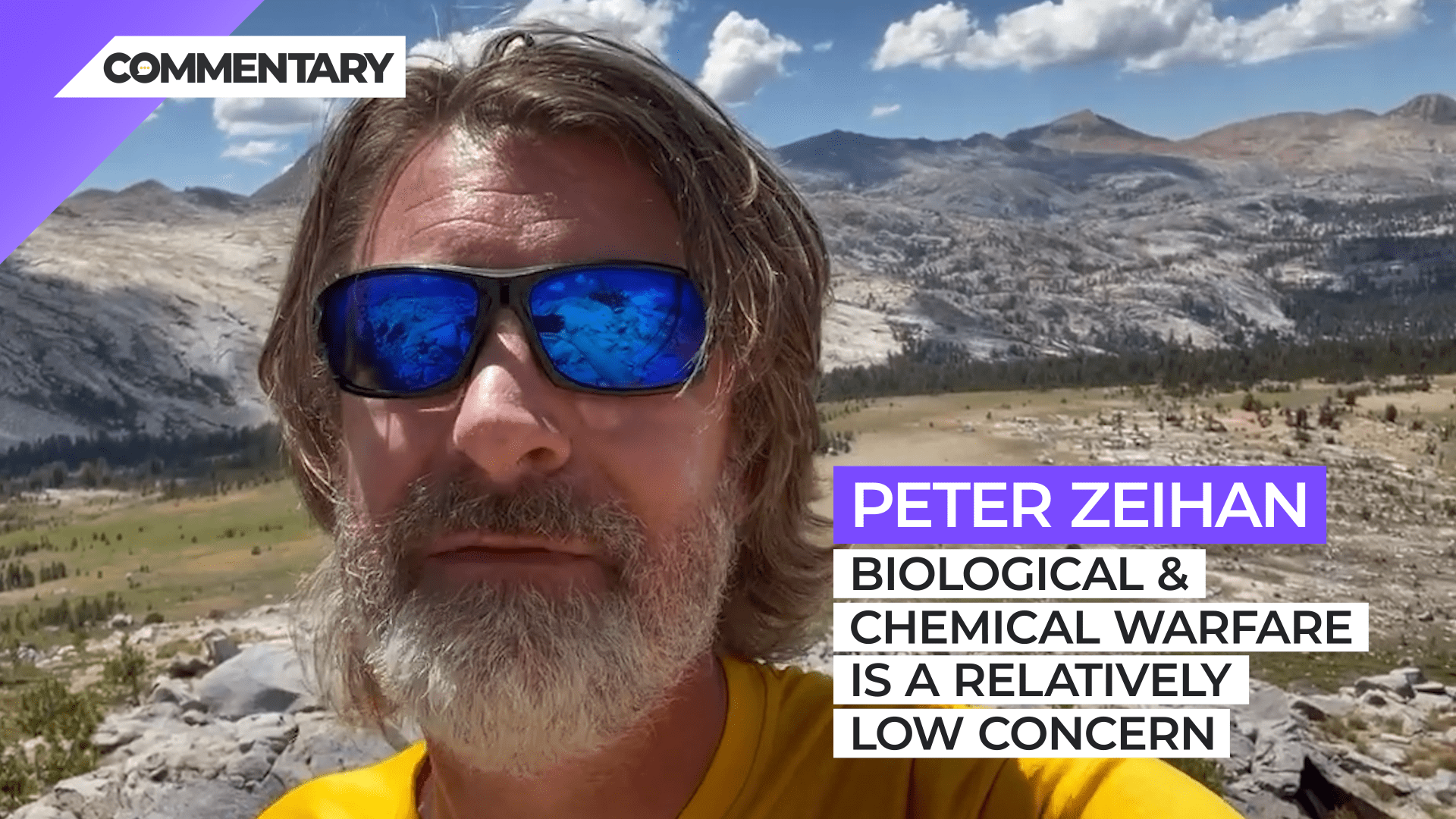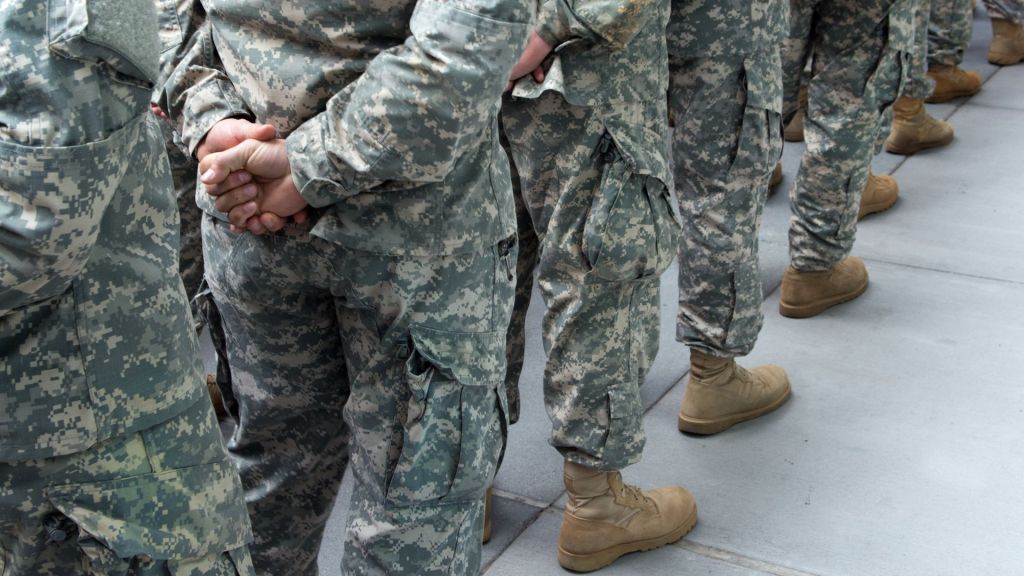
Commentary
-
Our commentary partners will help you reach your own conclusions on complex topics.
Everyone, Peter Zeihan here coming to you from just below is Isberg Pass on the border between the Ansel Adams Wilderness and Yosemite National Park. I’m on the Yosemite side. Back behind me…that is the head of what used to be the Merced Glacier. I’ve always liked this part of the park because it has some fascinating geology and almost no one comes here. Isberg is the least visited of the major passes.
Anywhoo, today is day four of my backpacking trip. And all of those of you who backpack semi-regularly know what day four means – it means fresh socks. And so on that topic, I thought today would be a great time to talk about chemical and biological warfare. Now, despite all of the concerns that we have had for the last several decades about weapons of mass destruction getting in the wrong hands,
I don’t mean to suggest that it’s a non concern, but it’s a relatively low concern. As the superpowers both discovered during the Cold War, chemical weapons are hard. It’s not so much the chemistry, it’s the delivery and dispersion. Because if it takes like a 100th of a gram of something to kill you, and you can put a few kilos into an artillery shell…but then you have to deal with simple atmospherics. And as they used to say in the 1980s, the solution to pollution is dilution.
And so you really need, if you want high casualty counts with chemical weapons, to disperse it in an area that is contained like a building. And all of a sudden you’re talking about a multibillion, really multi-hundred billion dollar project to kill what is in essence just a few 100 people – and if someone is smart enough to turn off the AC system, not even that. So it’s no surprise to me that conventions on chemical weapons actually passed and were adopted, were being implemented during the Cold War. Because they’re just not very effective at a battlefield weapon or even as a mass casualty weapon. There is a little wind here. I’m using my fancy microphone, and if that’s a problem, you can just skip to the next video, which will be even windier.
Anyhoo, that is chemical. Let’s talk biological. In many ways, everything that is difficult about chemical is also true for biological, it is very, very expensive to do and delivering the bug is very, very difficult. Because it’s not like most pathogens can just be released in the air and then they’ll do their thing and kill a lot of people. Excuse me, high elevation is going to my head. It’s…the bugs themselves are incredibly, incredibly non-viable in most environments. So now you’re talking tailored bugs for specific climates and elevations. And so the cost just keeps going up. And then of course, you still have the same delivery and dispersion problem that you have with chemicals. So as a rule biologicals cost more and achieve less.
Now, there are a couple of exceptions to these general rules, and really comes down to fear and terror attacks. If a terror group were able to get a hold of some of this stuff, they don’t really care what the economics of it are, because they’re not the ones who developed it. They…it would be a use it and lose it. But again, you’re talking about very, very low case counts and even lower casualty counts. The one possible exception is when you have a certain former superpower who likes to use chemical and biological agents as a assassination weapon. And there’s really nothing we can do about that.
Now we’re talking single digit number of people that the Russians have killed that way. So should you be concerned. You probably should reserve your caution for something that has a lot more likelihood of happening, like being killed by a vending machine. Okay, that’s it from me. Tomorrow is day five. Day five is a very exciting day for backpackers because that’s the day we get new underwear. No, we don’t. Until next time.
-
Hurricane Helene hits US coast, Appalachia and beyond
Hurricane Helene hit Florida and Georgia overnight between Sept. 26 and 27 as a Category 4 hurricane, and accompanying storms will continue reaching deeper into the continental United States today. Dangerous flash flooding from the hurricane, known as storm surge, was some of the worst flooding that the Tampa Bay area has ever seen, and… -
Israel holds upper hand against Lebanon, Hezbollah and Iran
On Wednesday, Sept. 25, Hezbollah launched a ballistic missile at Tel Aviv in retaliation for Israel’s explosive pager attack that blew up devices across Lebanon. Although Israel’s defense systems intercepted the surface-to-surface missile, the attempted strike on Tel Aviv marked a significant escalation by Hezbollah. Since the siege on Gaza began, shortly after the Oct. 7, 2023,… -
The Sinaloa Cartel civil war
Fears of a civil war within the Sinaloa Cartel are growing as violence between competing factions within the cartel continues. The Mexican Army has dispatched around 600 elite troops to Sinaloa to help quell those fears, in addition to roughly 2,200 regular soldiers and National Guard. Watch the above video as Straight Arrow News contributor… -
New Ukrainian weapons hit Russia where it hurts
Ukrainian drones struck a major Russian ammunition depot, triggering a massive explosion that was captured on camera. According to the Ukrainian military, 2,000 tons of munitions had arrived at the depot before the attack. Over the past two years, Ukraine has significantly increased its domestic drone production, allowing it to scale up attacks on military… -
Weighing social costs vs. economic benefits on immigration
Global human migration is one of the defining elements of our current historical era, according to the United Nations. Migrants face both the incentives to leave — forced out by climate change, crime and corruption, extreme poverty or violence — and incentives for where to go, based on available job opportunities and so on. Migration…
Latest Stories
-
 Getty Images
Getty Images
Potential top seeds still making their case for NCAA tournament committee
-
 Getty Images
Getty Images
DOD identifies $80 million in diversity and climate spending
-
 Getty Images
Getty Images
Severe weather threatens Mardi Gras celebrations in New Orleans
-
 Getty Images
Getty Images
MLB spring training: Mixed bag for National League teams 1 week in
-
 Getty Images
Getty Images
Illegal border crossing apprehensions plunge to 8,300 in February: Report
Popular Opinions
-
In addition to the facts, we believe it’s vital to hear perspectives from all sides of the political spectrum.
Latest Opinions
In addition to the facts, we believe it’s vital to hear perspectives from all sides of the political spectrum. We hope these different voices will help you reach your own conclusions.
The opinions published in this section are solely those of the contributors and do not reflect the views of Straight Arrow News.





















Latest Commentary
We know it is important to hear from a diverse range of observers on the complex topics we face and believe our commentary partners will help you reach your own conclusions.
The commentaries published in this section are solely those of the contributors and do not reflect the views of Straight Arrow News.
Dr. Frank Luntz
Pollster and Political Analyst‘Biased’: What Americans think of ‘mainstream media’
‘Getting rid of them’: Americans discuss Trump and immigration
‘Woke’: Why some Biden 2020 voters backed Trump in 2024